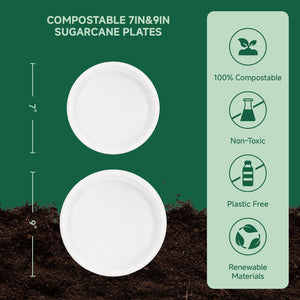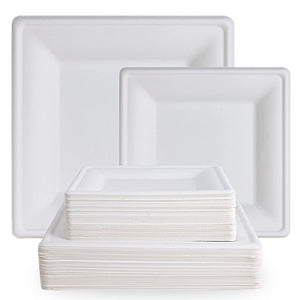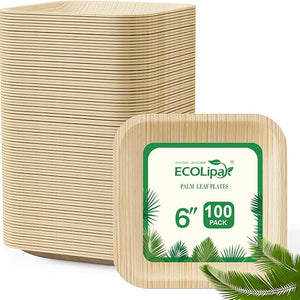Wholesale buyers face a real challenge when selecting biodegradable plates wholesale options for their businesses. The demand for sustainable and eco-friendly plates continues to rise as catering companies and environmentally conscious buyers seek better alternatives. Buyers want plates that deliver both strength and value, especially in busy catering environments. Eco-friendly and sustainable solutions now play a crucial role for buyers who care about the planet. Ecolipak stands out in the wholesale market, offering reliable biodegradable plates wholesale that meet the needs of catering and food service professionals. Many buyers trust Ecolipak for high-quality biodegradable tableware that supports eco-friendly and sustainable practices.
Key Takeaways
Choose biodegradable plates made from renewable materials like bagasse, kraft, or bamboo to support the environment and reduce waste.
Check for certifications such as FSC and DIN EN 13432 to ensure plates meet compostable and safety standards.
Select plates that are strong and leak-resistant to handle hot, oily, or saucy foods without breaking during catering events.
Compare prices and buy in bulk to get affordable, eco-friendly plates without sacrificing quality or sustainability.
Work with trusted suppliers like Ecolipak who offer reliable products, good customer support, and a commitment to green practices.
Key Factors for Wholesale Buyers
Eco-Friendliness and Sustainability
Wholesale buyers in the catering industry look for eco-friendly and sustainable solutions. They want plates that help protect the environment and support green practices. Eco-friendly plates made from bagasse or kraft materials break down naturally and do not harm the planet. Sustainable choices show that buyers care about the future and want to reduce waste in catering events and restaurants. Ecolipak leads by example, offering biodegradable plates wholesale that meet strict environmental standards.
Material Types and Certifications
Buyers must check the material of the plates. Bagasse and kraft are popular because they come from renewable sources. Bagasse plates use leftover sugarcane, while kraft plates use natural fibers. Both options are compostable and biodegradable. Certifications like FSC and DIN EN 13432 prove that the plates meet compostable packaging standards. Wholesale buyers should always ask for these certifications to ensure the plates are safe for the environment and suitable for catering business needs.
Durability and Performance
Catering businesses need plates that can handle heavy meals and sauces. Bagasse and kraft plates offer strong performance and do not leak or break easily. Buyers should test the plates for durability before making a wholesale purchase. Good performance means fewer problems during catering events and happier customers.
Cost and Bulk Pricing
Cost matters to every catering business. Wholesale buyers compare prices to find the best value. Bagasse and kraft plates often come with bulk discounts, making them affordable for large orders. Buyers should look for cost-effective options that do not sacrifice quality or sustainability. Ecolipak offers competitive pricing on compostable plates, helping buyers save money while staying eco-friendly.
Supplier Reputation
A reliable supplier ensures consistent quality and timely delivery. Wholesale buyers should choose suppliers with a strong reputation in the catering industry. Ecolipak stands out for its commitment to sustainable practices and customer satisfaction. Buyers trust Ecolipak for high-quality biodegradable tableware and compostable packaging that meets the needs of catering businesses and families alike.
Top Biodegradable Plates Wholesale Options
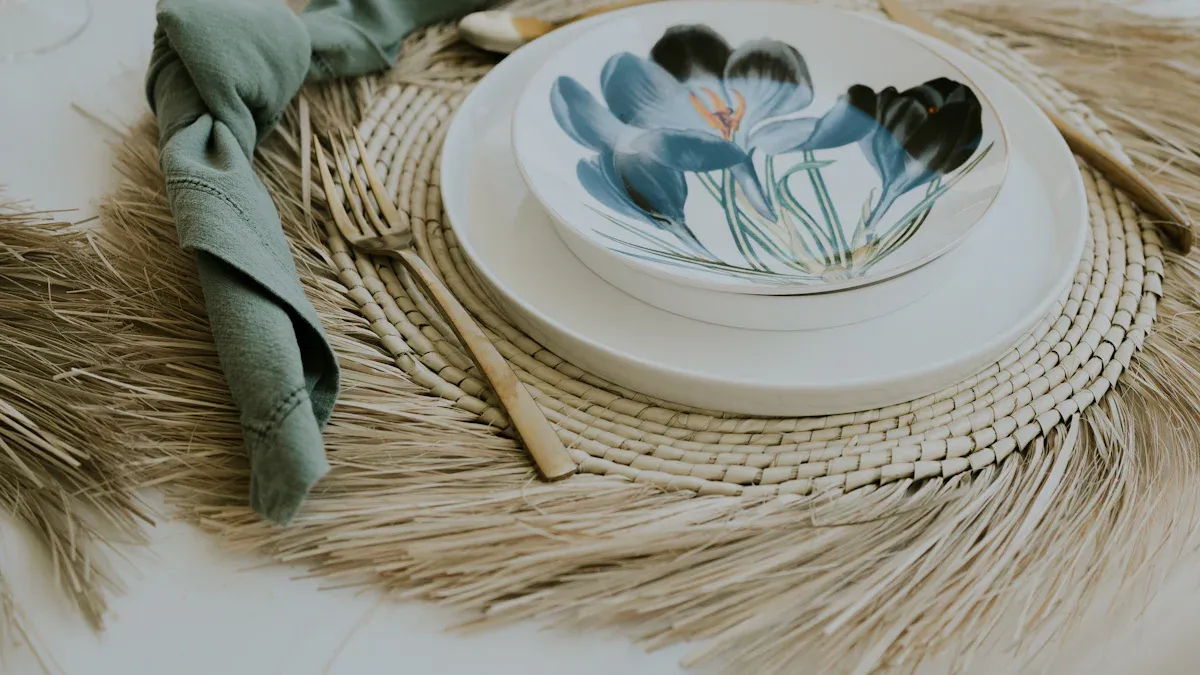
Ecolipak Compostable Sugarcane Plates
Ecolipak Compostable Sugarcane Plates set a high standard in the biodegradable plates wholesale market. These plates use bagasse, a by-product of sugarcane processing, which makes them both sustainable and eco-friendly. The manufacturing process uses waste material, reducing environmental impact and supporting a circular economy. Ecolipak plates come in several sizes, making them suitable for everything from small family gatherings to large catering events.
Ecolipak plates offer impressive durability. They hold up well with hot, oily, or saucy foods and resist leaks and cracks. Users can safely microwave or freeze these plates, adding convenience for both home and business use. Many customers praise the sturdy feel and clean design, noting that the plates perform as well as traditional disposable plates. Ecolipak’s commitment to compostable packaging and strict certifications ensures that every plate meets high environmental standards.
Note: Ecolipak’s customer stories highlight satisfaction with both quality and sustainability. Buyers appreciate the balance of cost, performance, and eco-friendly values.
Bamboo Plates
Bamboo plates have become a popular choice for wholesale buyers seeking sustainable and compostable options. Bamboo grows quickly and does not require replanting after harvest. This plant uses less water than trees and does not need pesticides, making it a strong choice for eco-friendly tableware. Bamboo plates naturally resist heat and moisture, so they do not need chemical coatings.
Bamboo plates stand out for their durability. They handle hot and cold foods without warping or breaking. Buyers can rinse and reuse bamboo plates before composting, which adds value for both families and businesses. These plates break down quickly in commercial composting facilities and carry certifications for compostability.
The following table compares bamboo plates to other common options in terms of sustainability and cost:
Plate Type |
Sustainability Factors |
Cost and Usability |
|---|---|---|
Bamboo Plates |
Fast-growing, no replanting, low water use, no pesticides, heat/moisture resistant |
More expensive, reusable before composting, durable, certified compostable |
Palm Leaf Plates |
Made from fallen leaves, renewable, often uncertified compostability |
Uneven surfaces, possible chemicals, moderate durability |
Paper Plates |
Trees cut down, high water/energy use, chemical coatings, less durable |
Often coated with PFAS, poor compostability |
Sugarcane Bagasse |
Made from waste by-product, low impact, sometimes PFAS-coated |
Sturdy, compostable, affordable, eco-friendly |
Styrofoam Plates |
Fossil fuel-based, non-biodegradable, microplastics |
Cheap, poor for environment, not compostable |
Bulk ordering bamboo plates can help lower costs, making them more accessible for wholesale buyers who want to balance sustainability and usability.
Palm Leaf Plates
Palm leaf plates offer a unique look and a natural feel. Manufacturers collect fallen palm leaves, clean them, and press them into shape. This process uses a renewable resource and avoids cutting down trees. Palm leaf plates appeal to buyers who want a rustic, eco-friendly option for events or restaurants.
Palm leaf plates often lack certified compostability, which can limit their environmental benefits.
Some plates may contain chemicals or coatings that affect compostability.
The texture of palm leaf plates includes ridges and uneven surfaces, which can make stacking and serving more difficult.
Compared to bamboo plates, palm leaf plates are less durable and may not handle heavy or saucy foods as well.
Palm leaf plates usually do not support reuse before composting.
Wholesale buyers should consider these factors when choosing palm leaf plates. While they provide a sustainable alternative to plastic, their usability and compostability may not match other options.
Cornstarch-Based Plates
Cornstarch-based plates provide another biodegradable solution for wholesale buyers. These plates use cornstarch and other plant fibers, making them compostable and suitable for single-use dining. Cornstarch plates break down in commercial composting facilities, helping reduce landfill waste.
Cornstarch plates offer a smooth surface and a clean appearance. They work well for serving light to moderate meals. However, they may not match the strength of bagasse or bamboo plates when holding hot or oily foods. Some cornstarch plates require additional coatings to improve durability, which can affect compostability.
Wholesale buyers often choose cornstarch-based plates for events, cafeterias, or takeout services that need affordable, eco-friendly options. These plates support sustainable practices and help businesses meet green goals.
Tip: Always check for certifications when buying cornstarch-based plates to ensure they meet compostable packaging standards.
Biodegradable Plates Wholesale Comparison Table
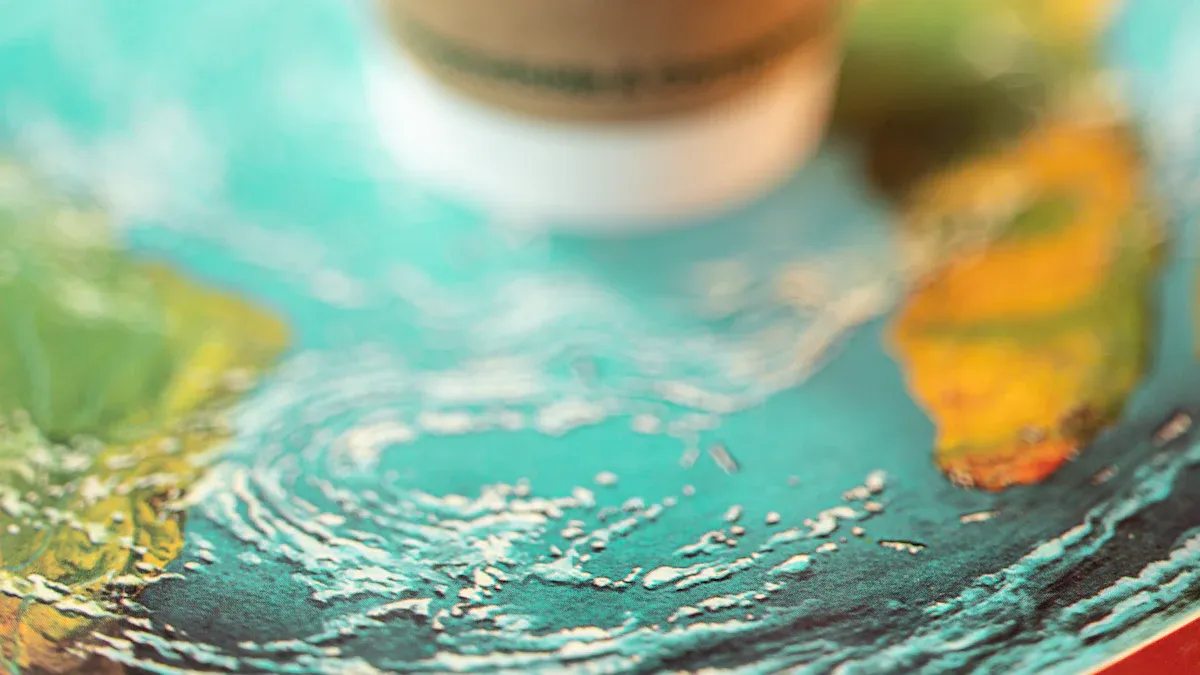
Key Specs and Features
Buyers often compare bagasse, kraft, bamboo, and palm leaf plates before making a decision. Each type offers unique features. Ecolipak Compostable Sugarcane Plates use bagasse, which comes from sugarcane waste. These plates resist leaks and hold hot or oily foods well. Kraft plates use natural fibers and provide a sturdy option for many settings. Bamboo plates offer a smooth finish and can handle both hot and cold foods. Palm leaf plates have a rustic look and come from fallen leaves, but their surfaces may feel uneven.
Plate Type |
Material |
Sizes Available |
Leak Resistance |
Microwave Safe |
Freezer Safe |
|---|---|---|---|---|---|
Ecolipak Sugarcane Plates |
Bagasse |
6", 7", 9", 10" |
Yes |
Yes |
Yes |
Kraft Plates |
Kraft |
Various |
Yes |
Yes |
Yes |
Bamboo Plates |
Bamboo |
Various |
Yes |
Yes |
Yes |
Palm Leaf Plates |
Palm Leaf |
Various |
Moderate |
Yes |
Yes |
Pricing and Bulk Discounts
Wholesale buyers look for value and savings. Ecolipak offers bagasse plates at $21.00 per box, with bulk discounts for larger orders. Kraft plates also come in bulk, often at similar price points. Bamboo plates usually cost more due to the material and process. Palm leaf plates fall in the mid-range. Bulk pricing helps businesses, families, and event planners save money while choosing eco-friendly options.
Tip: Buying in bulk reduces the cost per plate and supports sustainable choices for both businesses and families.
Environmental Impact
Bagasse and kraft plates both support environmental goals. Bagasse plates use sugarcane waste, reducing landfill and supporting compostable solutions. Kraft plates use renewable fibers and break down quickly. Bamboo plates grow fast and need little water, making them a strong environmental choice. Palm leaf plates use fallen leaves, but their compostability depends on processing. All these options help reduce plastic waste and protect the environment.
Choosing bagasse or kraft plates shows a commitment to environmental protection and health for families, businesses, and communities.
Choosing the Right Sustainable Plates for Wholesale Buyers
Matching Plates to Business Needs
Wholesale buyers in the catering industry must match plate types to their specific business needs. Bagasse plates work well for catering events that serve hot, oily, or saucy foods. Their sturdy build prevents leaks and cracks, making them a top choice for busy catering business operations. Kraft plates offer a natural look and strong performance for casual gatherings or eco-conscious restaurants. Bamboo plates suit upscale events where presentation matters, while palm leaf plates add a rustic touch to outdoor catering. Kraft and bagasse plates both handle heavy meals, making them reliable for foodservice buyers who need consistent quality. Buyers should consider the size, design, and compatibility of each plate with their catering equipment.
Negotiating with Wholesale Suppliers
Successful negotiations with wholesale suppliers require careful planning. Buyers should always verify certifications such as BPI Certified Compostable, DIN CERTCO, and FDA compliance to ensure plates meet compostability and food safety standards. Insisting on PFAS-free and plastic-free documentation protects both the environment and customer health. Testing product samples with real catering scenarios, such as serving hot or greasy foods, helps confirm performance. Buyers should research supplier track records, production capacity, and sustainability practices like ISO 14001 certification. When discussing cost, buyers need to consider not just the price per plate but also savings from reduced waste disposal and regulatory compliance. Establishing composting partnerships with local facilities can further support sustainable goals.
Ensuring Consistent Quality
Maintaining consistent quality is essential for every catering business. Buyers should monitor product outcomes after purchase, gathering feedback from staff and customers. Regular communication with suppliers helps address any issues and supports ongoing improvements. Ecolipak stands out by offering strong customer support and sharing real customer stories. Many buyers report satisfaction with the durability and eco-friendly design of Ecolipak’s bagasse plates. These stories highlight how Ecolipak helps catering businesses and families achieve their sustainable goals without sacrificing quality or cost control.
Wholesale Disposable Meal Prep Containers with Lids
Sustainable Alternatives for Food Service
Food service businesses need more than just plates to serve their customers. They also require disposable meal prep containers with lids that keep food fresh and secure. Many buyers now look for sustainable meal prep containers to match their eco-friendly plates. These containers help reduce plastic waste and support healthier choices for families and communities. Ecolipak offers a wide range of disposable meal prep containers with lids made from renewable materials. Their bagasse meal prep containers with lids use sugarcane fibers, which break down naturally after use. These containers provide a sturdy and leak-resistant option for hot or cold foods. By choosing biodegradable packaging, businesses and families show their commitment to protecting the environment.
Tip: Pairing plates with disposable meal prep containers with lids creates a complete, sustainable dining experience for customers.
Integrating Plates and Containers for Business Solutions
Catering companies, restaurants, and meal delivery services benefit from integrating plates and disposable meal prep containers with lids into their operations. Ecolipak’s packaging solutions include bagasse meal prep containers with lids that match the durability and eco-friendliness of their plates. This combination allows businesses to offer full meal service while reducing their environmental impact. Families who prepare meals at home also find these solutions convenient for storing leftovers or packing lunches. Ecolipak’s commitment to sustainable packaging solutions ensures that every product supports both health and the planet. By choosing disposable meal prep containers with lids from Ecolipak, buyers can trust that they are making a responsible choice for every meal.
Wholesale buyers in catering must consider eco-friendliness, durability, cost, and supplier reputation when choosing biodegradable plates. Ecolipak Compostable Sugarcane Plates deliver reliable performance for catering events and support sustainable practices. Many catering professionals value these plates for their strength and environmental benefits. Families and catering businesses can protect health and the planet by making responsible choices. Explore Ecolipak’s full range to find the best solutions for every catering need.
FAQ
What makes Ecolipak Compostable Sugarcane Plates eco-friendly?
Ecolipak plates use sugarcane bagasse, a renewable resource. These plates break down naturally after use. They help reduce landfill waste and support a cleaner planet.
Are biodegradable plates safe for hot and oily foods?
Yes. Ecolipak Compostable Sugarcane Plates resist leaks and hold hot, oily, or saucy foods. They stay sturdy during meals and do not crack easily.
Can families use Ecolipak plates for daily meals?
Families can use Ecolipak plates every day. The plates work well for picnics, parties, and home dinners. They offer a safe and healthy choice for all ages.
How should buyers dispose of biodegradable plates?
Buyers should place used plates in compost bins. The plates break down in commercial composting facilities. This process returns nutrients to the soil and protects the environment.
Do Ecolipak plates cost more than regular disposable plates?
Ecolipak plates offer competitive pricing, especially for bulk orders. Many buyers find the cost similar to regular plates. The added value comes from supporting health and environmental protection.





